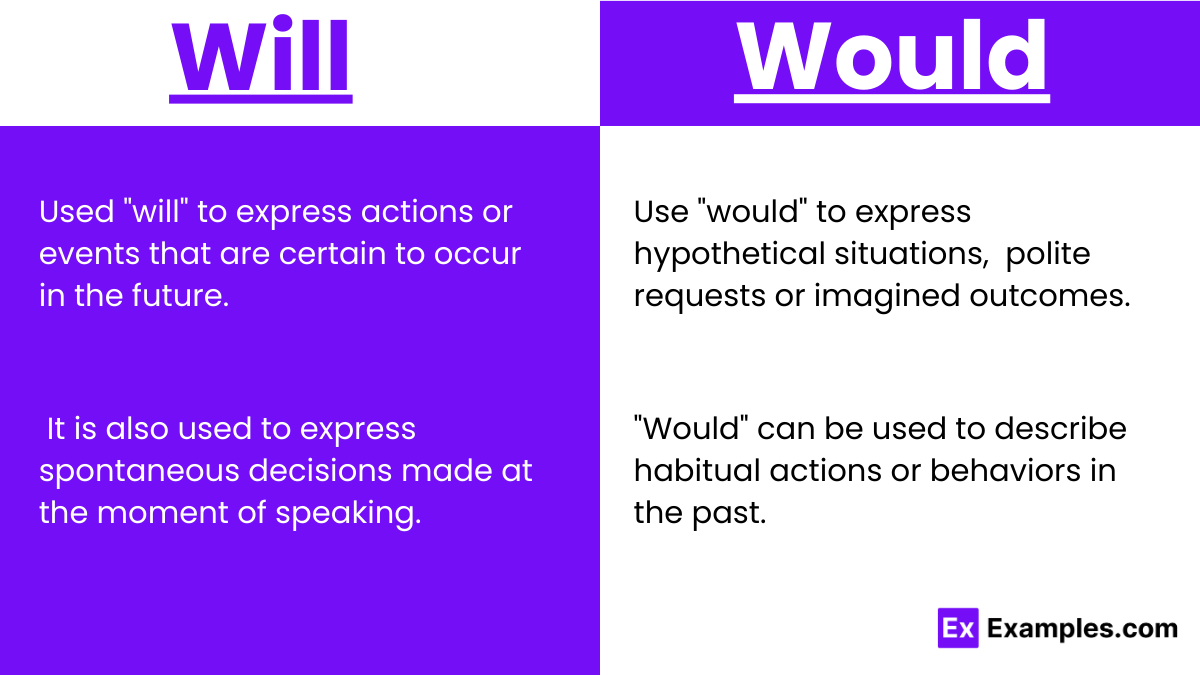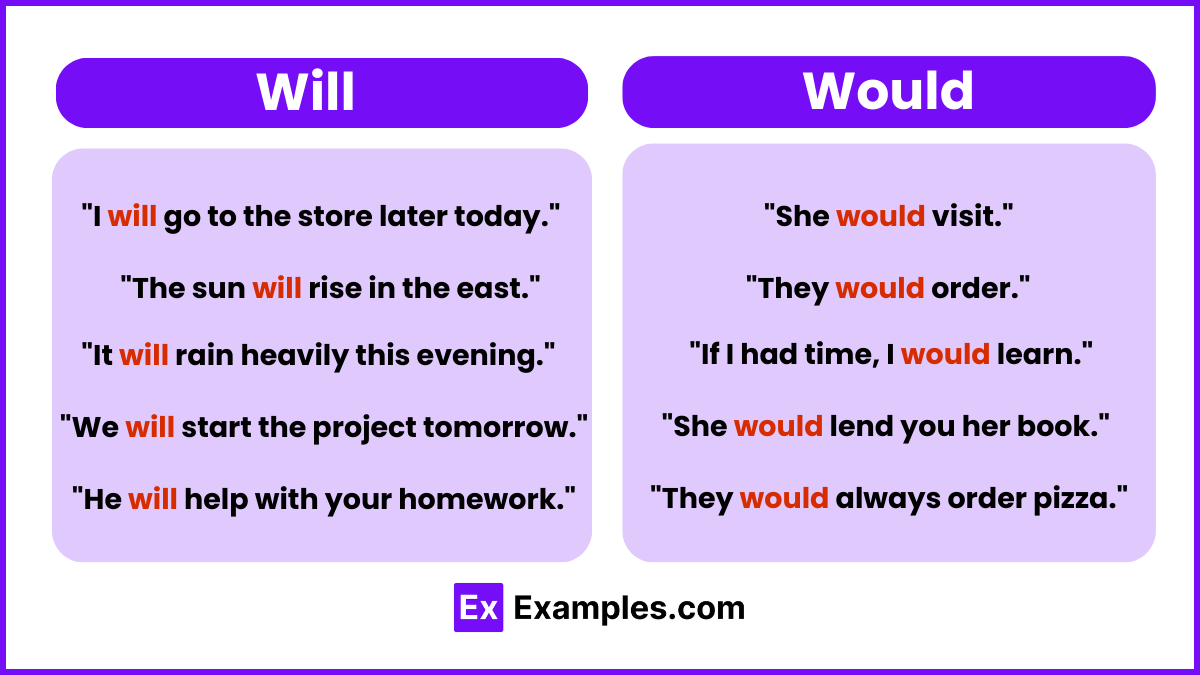Will vs Would
When learning English, understanding modal verbs like will and would is essential. These verbs are extensively used and form a fundamental part of English grammar. “Will” typically expresses future tense, certainty, or willingness, while “would” often indicates hypothetical situations, politeness, or past habitual actions. To ensure accurate usage, it’s vital to grasp the distinctions between will and would.
Will and Would – Meanings
“Will” and “Would” are both modal verbs used to express future actions or hypothetical situations but they used differently
- “Will” is used to express future intentions, predictions, or promises. It indicates a strong certainty or determination about something happening in the future.
- “Would” is often used to express hypothetical situations, polite requests, or conditional statements. It indicates a conditional or hypothetical action, often in response to a certain situation or condition.
Summary
Will and would are both helping verbs with various uses. Will expresses expectations, determinations, and capabilities. It’s also used to form the future tense, like “We will buy milk tonight.” Would, the past tense of will, is used for hypothetical statements in the subjunctive mood. When asking questions, would is considered more formal or polite.
How to Pronounce Will and Would
- Will: Pronounced as /wɪl/ (WILL).
- Would: Pronounced as /wʊd/ (WOOD).
Differences between Will and Would
| Aspect | Will | Would |
|---|---|---|
| Time | Talks about future | Talks about hypothetical or polite situations |
| Certainty | Shows strong certainty | Shows less certainty or is hypothetical |
| Politeness | Can be used for offers or requests | Often used for polite requests or suggestions |
| Conditionality | Not usually used for conditions | Used for unreal or hypothetical conditions |
| Reported Speech | Often used for direct quotes or intentions | Often used for indirect or polite requests |
| Formality | More casual in speech | More formal or polite in speech |
| Frequency | Used more commonly in everyday language | Less common in everyday conversation |
How to Remember the Difference between Will and Would
- “Will” is like a present or future “willpower” to do something. For example, “I will go to the store tomorrow.”
- “Would” is like a past version of “will” or used in hypothetical situations. You can think of it as a softened version of “will.” For example, “I would have gone to the store if it hadn’t rained.”
So, whenever you’re unsure, think about whether the action is happening now or in the future (will) or if it’s referring to something that could have happened in the past or in a hypothetical scenario (would).
When to use Will and Would

Usage of Will
“Will” is primarily used to talk about future actions, intentions, promises, or predictions.
Example: “I will go to the store tomorrow.”
- Future Tense: “Will” is commonly used to indicate future actions or states. For example: “I will go to the store tomorrow.”
- Spontaneous Decisions: It is also used to express spontaneous decisions made at the moment of speaking. For instance: “Oh, I’ll help you with that.”
- Promises: “Will” is used to make promises or commitments. For example: “I will always be there for you.”
- Predictions: It can be used to make predictions about the future based on current evidence or beliefs. For instance: “I think it will rain later.”
Usage of Would
“Would” is often used to express hypothetical situations, polite requests, or past habits.
Example (Hypothetical): “If I won the lottery, I would travel the world.”
- Conditional Statements: “Would” is often used in conditional statements, particularly in the second part of the sentence. For example: “If I had more time, I would travel more.”
- Polite Requests or Offers: It is commonly used to make polite requests or offers. For instance: “Would you mind closing the window?”
- Habitual Actions in the Past: “Would” can be used to describe habitual actions or behaviors in the past. For example: “When I was younger, I would always play outside.”
- Describing Imaginary or Hypothetical Situations: “Would” is used to describe imaginary or hypothetical situations. For instance: “If I won the lottery, I would buy a mansion.”
Will and Would – Examples

Examples of Will
- She will graduate from university next year.
- I will help you with your project tomorrow.
- He will definitely be at the meeting on time.
- The company will launch a new product next month.
- Will you join us for dinner tonight?
Examples of Would
- If I had more money, I would travel around the world.
- Would you pass me the salt, please?
- She said she would call me later.
- If it were warmer, we would go for a picnic.
- I would always visit my grandparents on weekends when I was a child.
Synonyms
| Will | Would |
|---|---|
| Desire | Could |
| Choose | Might |
| Shall | Should |
| Resolve | Could |
| Plan | Might |
Exercise
- If I had more time, I ________ travel to Europe.
- She ________ like to become a doctor when she grows up.
- He said he ________ help us with the project.
- Would you ________ mind opening the window, please?
- I ________ definitely attend the party if I finish my work early.
Answers
- would
- would
- would
- would
- will
FAQ’S
Is it I said I will or would?
It depends on the context. “Will” indicates a definite intention, while “would” implies a conditional or hypothetical action.
Which is more polite: will or would?
“Would” is generally considered more polite, as it softens the tone and adds a sense of politeness and deference to a request or statement.
Which is correct: would be or will be?
Both are correct, but “will be” indicates a more definite future action, while “would be” suggests a hypothetical or conditional scenario.
Can I use would for future?
Yes, “would” can be used for the future to express hypothetical situations, conditional actions, or polite requests.
Can I use will for future?
Yes, “will” is commonly used for future actions, expressing certainty or determination regarding what will happen.


